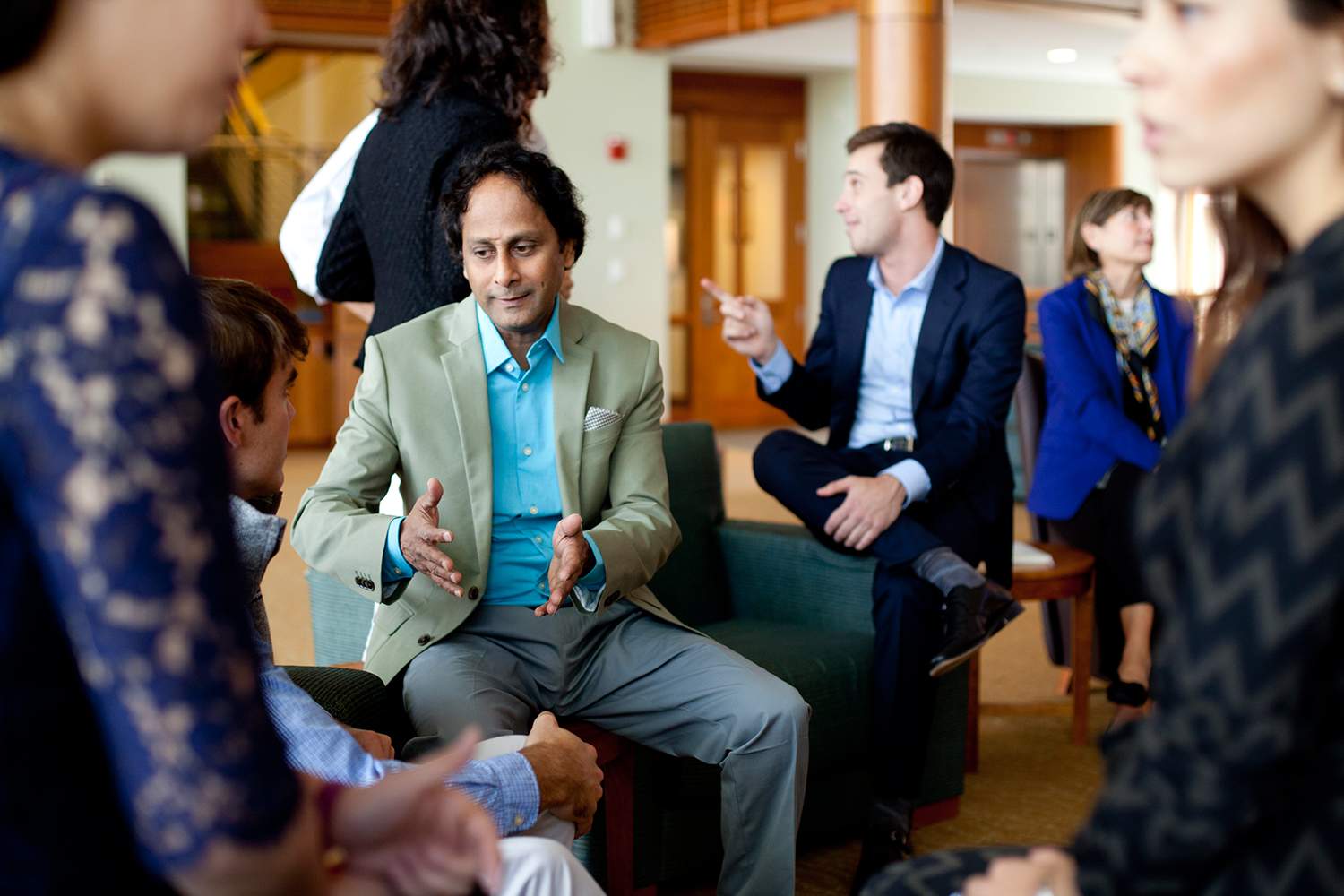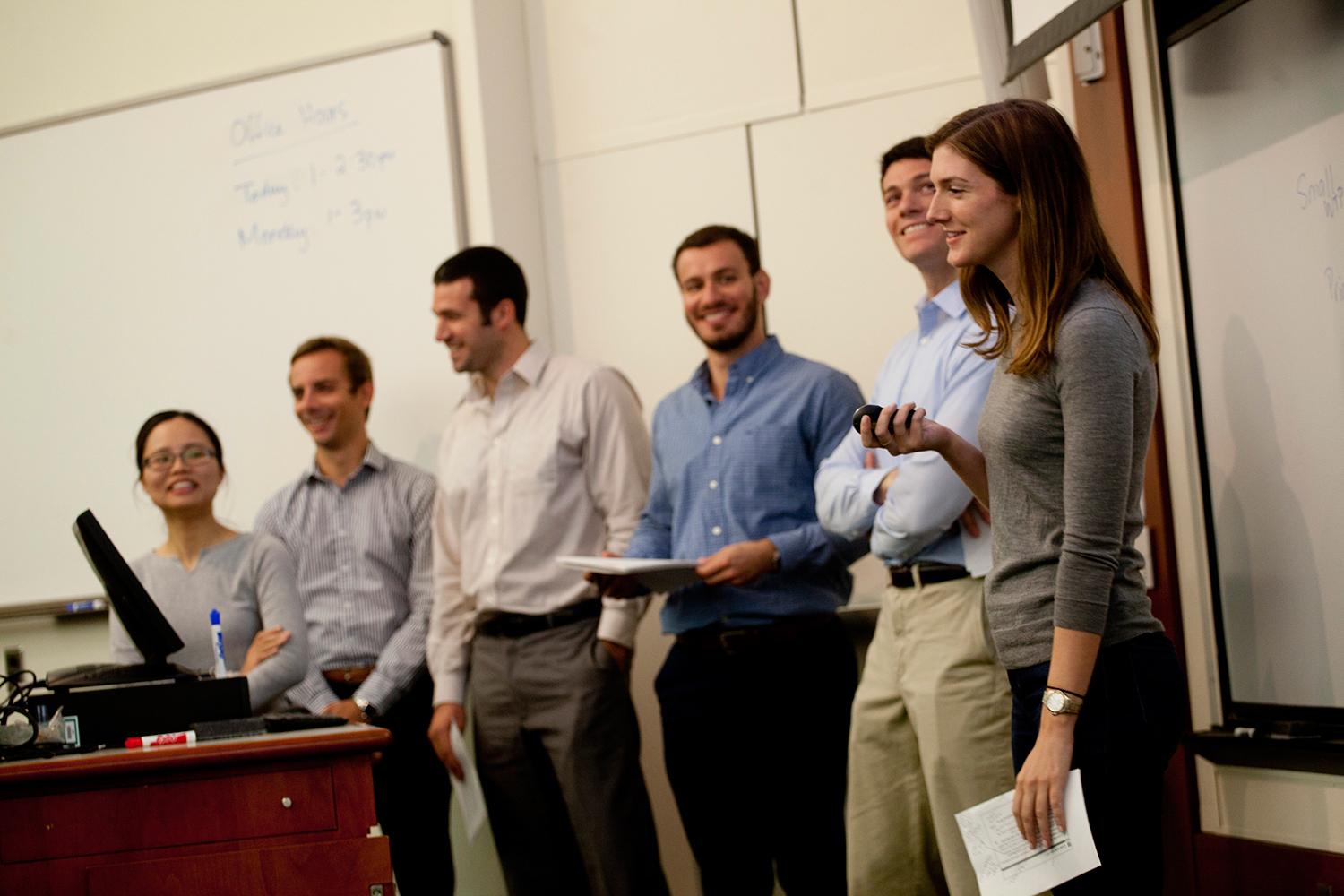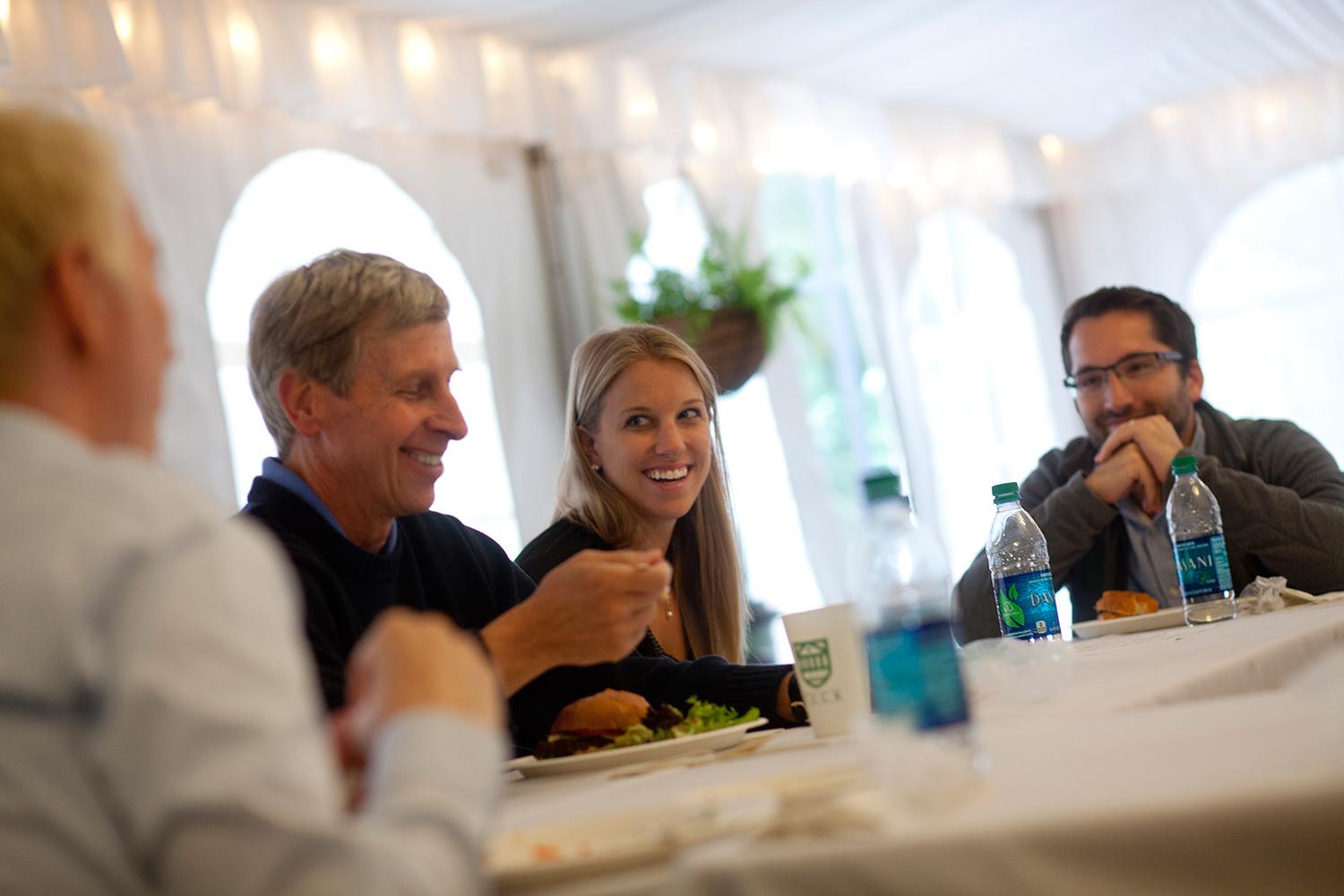
Innovate to Educate
Six major innovations to the MBA program have been introduced in the past year, targeting leadership, globalization, and inclusivity.
By Kirk Kardashian
Jan 11, 2017

Six major innovations to the MBA program have been introduced in the past year, targeting leadership, globalization, and inclusivity.
Back in 2013, marketing professor Praveen Kopalle chaired an MBA taskforce charged with enhancing Tuck’s MBA curriculum. Through end-of-year student surveys and a study performed by the Parthenon Group, the taskforce discovered that Tuck needed to do more to foster leadership skills, expand students’ global mindset, and make the Tuck community more inclusive.
Last year, Kopalle was named the associate dean for the MBA Program, and he immediately began putting the taskforce’s recommendations into action. As a result, the MBA program has rolled out six major innovations that have made a significant impact on students’ Tuck experience, both academically and personally.

In the spring of 2015, while serving her first of two terms on the Tuck Student Board, Danielle Garver T’16 noticed some discussion among the board members about the need for more personalized leadership development. By mid-summer, she had mentioned the idea to Kopalle, who worked quickly to get a program ready for the fall.
What Kopalle created, with input from Garver and other students, is the Personal Leadership Initiative, an optional “micro-course” that augments the leadership training all MBA students get during their first year at Tuck. It begins with a four-hour workshop in the spring with renowned CEO coach and author Marshall Goldsmith. During the session, Goldsmith, a frequent presence in Tuck Executive Education programs, gives students a framework for personal development, weaving in stories from his own life and coaching career at the same time. The framework is essentially a habit: recognizing what personal behavior you want to change, and then working with a partner to give and receive feedback on progress towards that change.
Tuck added two key technological elements to Goldsmith’s workshop. One is an algorithm, developed to pair hospitals with residents, that matches students with partners. The other is a custom-built platform on Canvas that allows students to track their behavior change and receive feedback from their partner and others. “It’s a great example of mass customization on the personal level,” Kopalle says. “It’s scalable and personal, which is a rare combination.”
The perspective that I got on myself from the outside is something that has stuck with me, and now I have a much clearer view of how my leadership style is perceived by others.
Being involved with the program’s creation was the most entrepreneurial exercise she completed at Tuck, says Garver. She found challenges in ideating, keeping her team motivated, and iterating based on student feedback. “The perspective that I got on myself from the outside is something that has stuck with me, and now I have a much clearer view of how my leadership style is perceived by others,” says Garver.
Apurva Sacheti T’16 wanted to start giving back to Tuck before he became an alumnus. So when he heard about the new Deanery Fellows Program, where 10 students research ways to enhance Tuck by partnering with the Tuck Student Board and Deanery, he applied right away. In fact, he had already been thinking about one of the very issues the program was targeting: making Tuck more global. “A couple of months into my second year, I was having a lot of conversations on how international students could impact learning in the classroom, so the timing was just right,” he says.
In its inaugural year, the Deanery Fellows Program appointed three committees to investigate issues relating to inclusivity, globalizing the Tuck curriculum, and careers.
The committee on inclusivity worked to identify key recommendations for the Deanery, MBA Program Office, Student Board, and the student body, on how to enhance the inclusive culture at Tuck. The students on the committee started by collecting and analyzing student survey data and focus group feedback, and formulated three general hypotheses: that the first 100 days at Tuck are influential for setting the cultural tone of the two-year experience; some students are more inclined than others to plan activities and engage in leadership roles; and community values play an active role in setting norms for student behavior, communication, and leadership.
Sacheti’s committee studied ways to enhance the global curriculum at Tuck. Through interviews with students, alumni, professors, and the Deanery, the committee formulated several recommendations, including developing a new core class around global business challenges and mindsets; incorporating game-show-like clickers into the classroom, so students can participate in multiple choice questions and see real-time data; and capturing more data from students’ backgrounds that’s relevant to the classroom discussion.
As Tuck’s student body has become more diverse, our students’ interest in career paths has become much more diverse as well.
Working closely with the Tuck Career Development Office (CDO), the Deanery Fellows careers team focused on improving the overall career search experience for students. The process helped Masland and his team define seven core services they provide the Tuck community—career exploration, application materials, networking, interview preparation, and offer negotiation, as well as on-campus and off-campus recruiting.

In most Tuck courses, classroom participation from students, in the form of answering professors’ questions or offering ideas and perspectives, is a vital component of the learning atmosphere. In addition, participation is usually part of each student’s grade, so it’s important to have a fair, consistent way for professors to track the quantity and quality of what students say in class. The Classroom Scribes Initiative, which began in the winter of 2016, is aimed at enriching the student experience via enhancing classroom discussion, spurring broader participation, offering more feedback regarding class participation, and allowing faculty to focus on content and classroom dynamics.
Classroom scribes are Tuck partners as well as professionals from the Upper Valley who sit in on each core course and objectively track students’ participation during class. These reports are then matched to a seating chart (students are randomly assigned seats in each course) so professors can review student participation and note if they are favoring one area of the room over another.
Visiting professor Joe Hall, who teaches the core Operations course, noticed the benefit of his classroom scribe right away. “It’s a wonderful thing having someone there to document what has happened, who said what—it really allows me to focus on my teaching,” he says. “The reality is there’s probably a certain amount of unconscious bias that gets introduced. I think the scribes are perceived as a positive all the way around.”

As Tuck strives to create an environment that’s distinctly personal, connected, and transformative, it’s imperative to give students a convenient way to interact casually with their professors outside of class. The new faculty-student lunch program is designed to do just that. The program is exactly what it sounds like: regularly scheduled small-group lunches with students and faculty in Byrne Dining Hall, funded by the Tuck Deanery.
Vijay Govindarajan, the Coxe Distinguished Professor of Management, teaches the popular elective Implementing Strategy, which has two sections of 60-80 students each. He usually holds his faculty-student lunches immediately after class, which gives him and the students a chance to discuss issues from the day’s class in more of a seminar style. The lunch meetings are capped at 10 students, so over the course of the term Govindarajan can dine with everyone in his class. “I really believe that’s the strength of Tuck,” he says, “that students can have that kind of relationship with the faculty.”
When it comes to innovation, Tuck has a significant advantage over other organizations. The advantage is in the faculty, a group of gifted thinkers, teachers, and researchers who can help the school continually improve. That’s the reasoning behind the Tuck Teaching Colloquia: to get the faculty in a room to brainstorm about ways to make Tuck better. The sessions produce good ideas, but they also serve as a way for Dean Matthew Slaughter to communicate some of the school’s priorities to the faculty, and to build coherence among them about what Tuck stands for.
The first colloquium was held in the fall of 2015 and featured five faculty members presenting on the theme of “integration across courses.” More than 35 faculty attended and voiced numerous recommendations, such as designing a second-year integration elective—for example, Mergers and Acquisitions—taught by faculty from the finance, strategy, economics, operations, and marketing areas.
The theme of the second colloquium, which 40 faculty attended last winter, was “enhancing the global content in the curriculum.” Govindarajan was one of the presenters at this session, and he discussed three ways Tuck could become more globalized: by bringing in more international students and faculty, and teaching more international cases.
In the spring of 2016, the teaching colloquium focused on enhancing the student experience at Tuck, and the faculty recommended creating a task force, headed by Kopalle, to further study the question and implement ideas on enhancing the Tuck curriculum.
“I presented these MBA innovations on Friends and Family Day in June,” Kopalle says, “and to prospective students in China, and both groups were excited to see how Tuck is at the cutting edge of these three areas.”

Tuck has offered students global learning opportunities for many years, but the class of 2017 was the first class required to complete a global program in order to graduate. In order to meet the TuckGO requirement, students must take part in one of four programs: a Global Insight Expedition (GIX), a qualifying First-Year Project, an OnSite Global Consulting project, or an international exchange with one of Tuck’s partner institutions. Last year, 330 students visited 32 countries in pursuit of real-world international business experience and cultural understanding.
Last year’s GIX to Vietnam is a perfect example of how TuckGO is marshaling the resources of Tuck and Dartmouth to provide students with meaningful, once-in-a-lifetime opportunities for global learning. The Vietnam GIX was led by Curt Welling, a senior fellow at the Center for Business, Government & Society and the former president of Americares, who partnered with Dartmouth history professor Ed Miller, an expert on Vietnam.
“It turned out to be a great partnership,” Welling says. “What came out of it is some fresh thinking in TuckGO about how we can leverage different resources here to intensify the academic experience for students.”
In Vietnam, students focused on the transition from communism to state-run capitalism. Toward that end, they visited a state-owned enterprise, academic institutions, large Vietnamese companies, large international companies (such as Nike and Coca Cola), and met with entrepreneurs in Saigon, where they listened to startup pitches and offered their critiques.
On their face, TuckGO courses are about building students’ global perspectives, but they end up being about inclusivity, too. “One of the premises here is we’re going to put all of our assumptions about the way things should work, that are based on our cultural perspective, off to the side,” Welling explains. “And we’re going to look with fresh eyes that aren’t culturally influenced.”